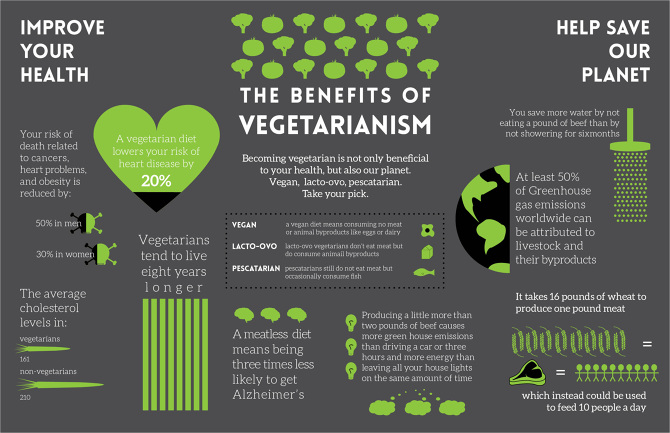WHAT WOULD HAPPEN IF THE WORLD WENT VEGAN?
Chances are you or someone you know is a vegetarian. But what would happen if everyone in the world were suddenly a vegetarian? What effects would it have on our lives and our planet?
The worldwide rate of vegetarianism is fairly low about 4-5% in the US, to a little 30% in India and 17% in Europe. As a result, there are currently about 20 billion chickens, 1'5 million cows, over a billion sheep and nearly a billion pigs in the world. Without any meat-eating humans to provide a market, whole herds of domestic animals would disappear and this would free up vast quantities of land. About 33 million squared kilometers of land are used for pasture- an area about the size of Africa! And that's not even counting the land used to grow crops exclusively for animal feed. Some of it would be needed for the increased amount of vegetables crops, but most of the land currently used as pasture is too dry to grow crops. Without humans adding artificial nutrients, this land could turn to dessert. But if properly managed it is possible that farmland could return to its natural state of grassland which could help with global climate.
Cows and other grazers affect our climate through large amounts of methane production which has 25 times more potential planet-warming power than CO2. Livestock production is responsible for about 15% of global greenhouse gas emissions, which is more than all the world's planes, trains and cars put together. In fact, many scientists believe that reducing meat consumption may be one of the best strategies for managing climate change.
A vegetarian diet would also greatly reduce water consumption; around 70% of global fresh water is used in agriculture. It takes 15 000L of water to make a kg of beef, 6000L for pork and 4000L for chicken. In comparison to vegetable crops it only takes 1600L for cereal, 900L for fruit and 300L for vegetables.
So are there any downsides to a vegetarian diet? Well, we would be left with without a cheap source for many byproducts of livestocks like leather from animals or animal fats which are used in cosmetics, candles and detergents. But luckily vegetable, cruelty-free products do exist and work just as good.
A more complicated fact is that raising and processing animals is a full time job for more than 1 billion people and if meat consumption were to be cut off they would be left without their employment. This would be very risky but most of them would be able to move to the production of milk, eggs or even growing vegetable crops.
Of course, any increase in vegetarianism is likely to be a gradual process rather than a sudden cut-off but you can see for yourself that it is indeed, a very sensible decision to think about.
The worldwide rate of vegetarianism is fairly low about 4-5% in the US, to a little 30% in India and 17% in Europe. As a result, there are currently about 20 billion chickens, 1'5 million cows, over a billion sheep and nearly a billion pigs in the world. Without any meat-eating humans to provide a market, whole herds of domestic animals would disappear and this would free up vast quantities of land. About 33 million squared kilometers of land are used for pasture- an area about the size of Africa! And that's not even counting the land used to grow crops exclusively for animal feed. Some of it would be needed for the increased amount of vegetables crops, but most of the land currently used as pasture is too dry to grow crops. Without humans adding artificial nutrients, this land could turn to dessert. But if properly managed it is possible that farmland could return to its natural state of grassland which could help with global climate.
Cows and other grazers affect our climate through large amounts of methane production which has 25 times more potential planet-warming power than CO2. Livestock production is responsible for about 15% of global greenhouse gas emissions, which is more than all the world's planes, trains and cars put together. In fact, many scientists believe that reducing meat consumption may be one of the best strategies for managing climate change.
A vegetarian diet would also greatly reduce water consumption; around 70% of global fresh water is used in agriculture. It takes 15 000L of water to make a kg of beef, 6000L for pork and 4000L for chicken. In comparison to vegetable crops it only takes 1600L for cereal, 900L for fruit and 300L for vegetables.
So are there any downsides to a vegetarian diet? Well, we would be left with without a cheap source for many byproducts of livestocks like leather from animals or animal fats which are used in cosmetics, candles and detergents. But luckily vegetable, cruelty-free products do exist and work just as good.
A more complicated fact is that raising and processing animals is a full time job for more than 1 billion people and if meat consumption were to be cut off they would be left without their employment. This would be very risky but most of them would be able to move to the production of milk, eggs or even growing vegetable crops.
Of course, any increase in vegetarianism is likely to be a gradual process rather than a sudden cut-off but you can see for yourself that it is indeed, a very sensible decision to think about.

Comentarios
Publicar un comentario